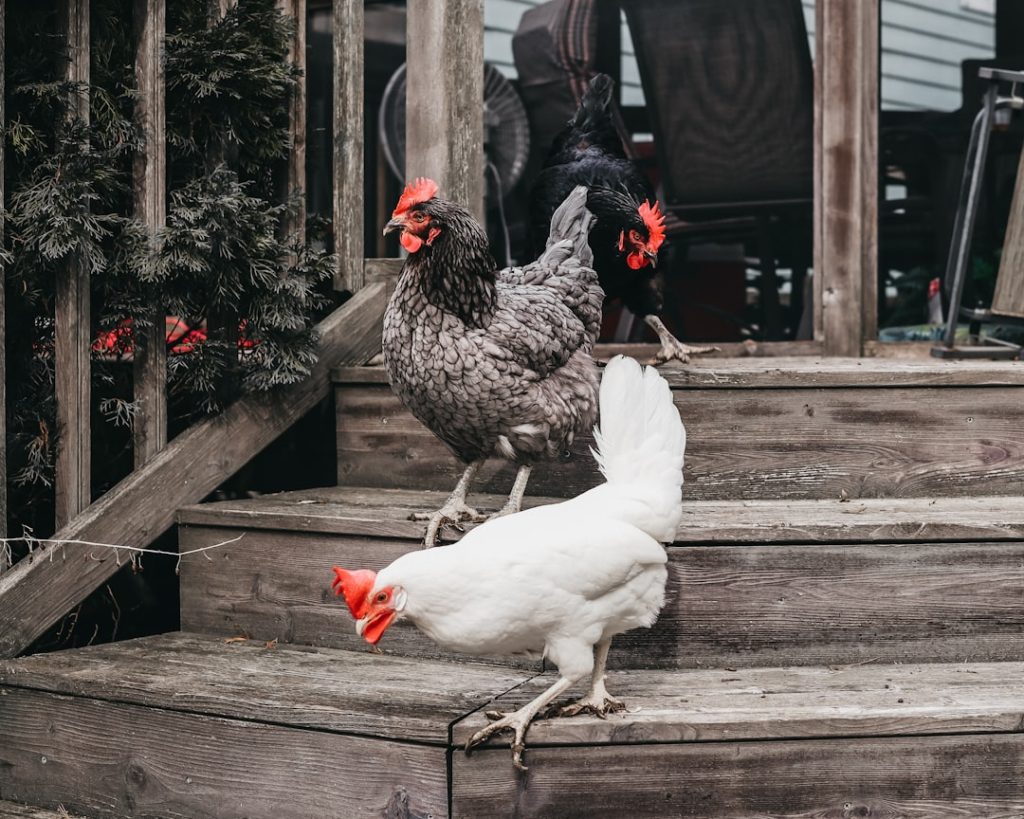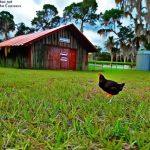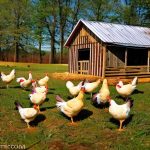When selecting chickens for a backyard flock, several factors should be considered. Climate is a crucial consideration, as some breeds are better adapted to cold weather, while others thrive in warmer conditions. The intended purpose of the flock is also important, whether it’s for egg production, meat production, or companionship.
Breeds like Leghorns and Rhode Island Reds are known for high egg production, while Cornish Cross and Jersey Giants are suitable for meat production. Temperament is another significant factor, as breeds vary in their docility and friendliness. Some chickens are more skittish or aggressive than others, so it’s essential to choose a breed that aligns with personal preferences and lifestyle.
Flock size and available space should also be taken into account. Smaller breeds like bantams are suitable for limited spaces, while larger breeds such as Orpingtons or Australorps are better suited for free-range environments with more space. Careful consideration of these factors, along with thorough research, will help ensure the selection of an appropriate chicken breed for a backyard flock.
This approach helps match the chickens to the specific needs and circumstances of the owner.
Table of Contents
- 1 Providing a Suitable Coop and Run
- 2 Feeding and Watering
- 3 Maintaining Proper Health and Hygiene
- 4 Managing Egg Production
- 5 Protecting from Predators
- 6 Ensuring Proper Egg Collection and Storage
- 7 FAQs
- 7.1 What are the basic requirements for keeping egg laying chickens?
- 7.2 What type of housing is suitable for egg laying chickens?
- 7.3 What should be included in the diet of egg laying chickens?
- 7.4 How can I ensure the health and well-being of my egg laying chickens?
- 7.5 How can I encourage egg production in my chickens?
Key Takeaways
- Consider the climate, space, and purpose of raising chickens when choosing the right breed for your flock
- Provide a coop and run that offers enough space, protection from the elements, and security from predators
- Ensure a balanced diet for your chickens, including a mix of grains, protein, and access to fresh water at all times
- Regularly clean the coop, provide proper ventilation, and monitor for signs of illness to maintain the health and hygiene of your flock
- Keep track of egg production, provide nesting boxes, and collect eggs daily to ensure proper management of egg production
- Install fencing, secure latches, and use deterrents to protect your chickens from predators such as raccoons, foxes, and birds of prey
- Collect eggs daily, store them in a cool, dry place, and use proper handling techniques to ensure egg quality and safety
Providing a Suitable Coop and Run
The Importance of a Well-Designed Coop
The coop serves as a shelter for your chickens, protecting them from the elements and providing a safe place for them to roost at night. When designing or selecting a coop, it’s important to consider factors such as ventilation, insulation, and predator-proofing. Adequate ventilation is crucial for maintaining good air quality and preventing moisture buildup, which can lead to respiratory issues in chickens. Insulation is also important, especially in colder climates, to help regulate the temperature inside the coop. Additionally, it’s essential to ensure that the coop is secure and predator-proof, with sturdy locks and barriers to keep out potential threats like raccoons, foxes, and birds of prey.
Designing a Safe and Stimulating Run
In addition to a coop, it’s important to provide your chickens with a run or outdoor enclosure where they can exercise and forage for food. The size of the run will depend on the number of chickens in your flock and the amount of space you have available. Ideally, each chicken should have at least 10 square feet of outdoor space to roam. It’s also important to provide enrichment in the run, such as perches, dust baths, and toys, to keep your chickens mentally and physically stimulated.
Ensuring Predator-Proofing and Security
Finally, it’s crucial to ensure that the run is secure and predator-proof, with a sturdy fence buried at least a foot into the ground to prevent digging predators from gaining access. By providing a suitable coop and run for your backyard flock, you can ensure that your chickens have a safe and comfortable environment to thrive in.
Feeding and Watering
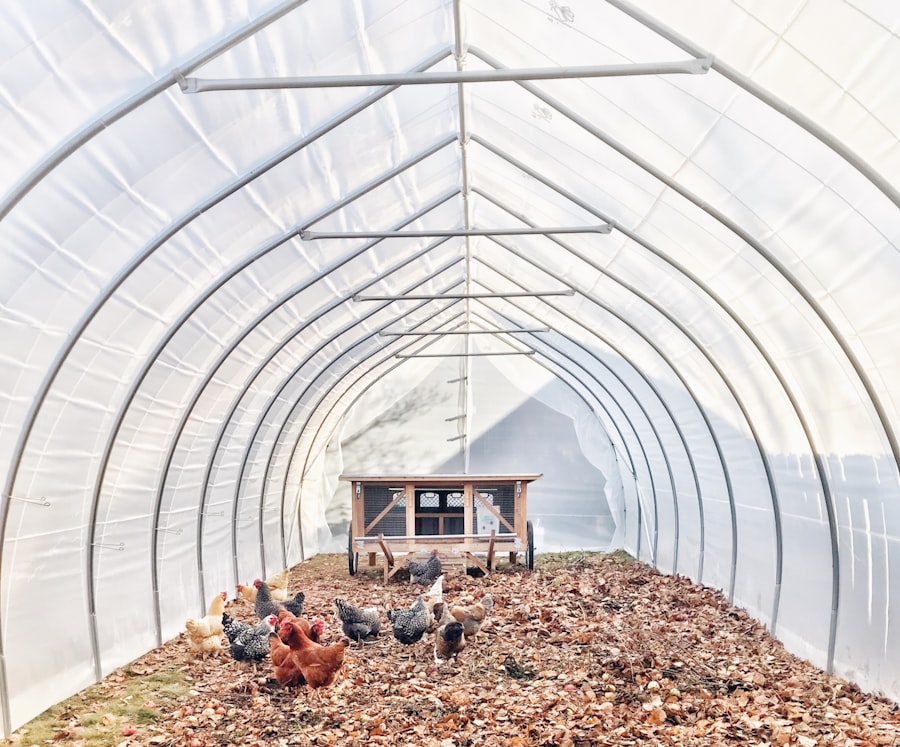
Feeding and watering are essential aspects of caring for a backyard flock of chickens. A balanced diet is crucial for ensuring that your chickens stay healthy and productive. A good quality commercial feed is a great base for their diet but supplementing with kitchen scraps and garden greens can be beneficial as well.
It’s important to provide access to fresh water at all times as well as ensuring that their feeders are kept clean and free from mold or contaminants. Additionally, providing grit and oyster shell will help with digestion and eggshell production respectively. In addition to providing a balanced diet, it’s important to consider the specific nutritional needs of different stages of chicken development.
Chicks require a higher protein content in their feed compared to adult chickens in order to support their rapid growth. Layers need a higher calcium content in their diet to support egg production. It’s also important to monitor their food intake and adjust accordingly based on their activity level and environmental conditions.
Maintaining Proper Health and Hygiene
Maintaining proper health and hygiene is crucial for keeping your backyard flock of chickens happy and healthy. Regular health checks are essential for catching any potential issues early on. This includes checking for signs of illness or injury such as lethargy, abnormal droppings or feather loss.
It’s also important to keep an eye out for parasites such as mites or lice which can cause discomfort and health issues for your chickens. In addition to regular health checks, it’s important to maintain a clean living environment for your chickens. This includes regularly cleaning out their coop and run to prevent the buildup of waste and bacteria.
Providing dust baths can help with parasite control as well as keeping their feathers clean and healthy.
Managing Egg Production
Managing egg production is an important aspect of caring for a backyard flock of chickens, especially if one of your primary goals is egg collection. It’s important to provide nesting boxes where your hens can lay their eggs in a safe and comfortable environment. These boxes should be filled with clean bedding such as straw or wood shavings.
It’s also important to collect eggs regularly to prevent them from being damaged or attracting pests. Eggs should be collected at least once a day and stored in a cool place until they can be consumed or sold.
Protecting from Predators
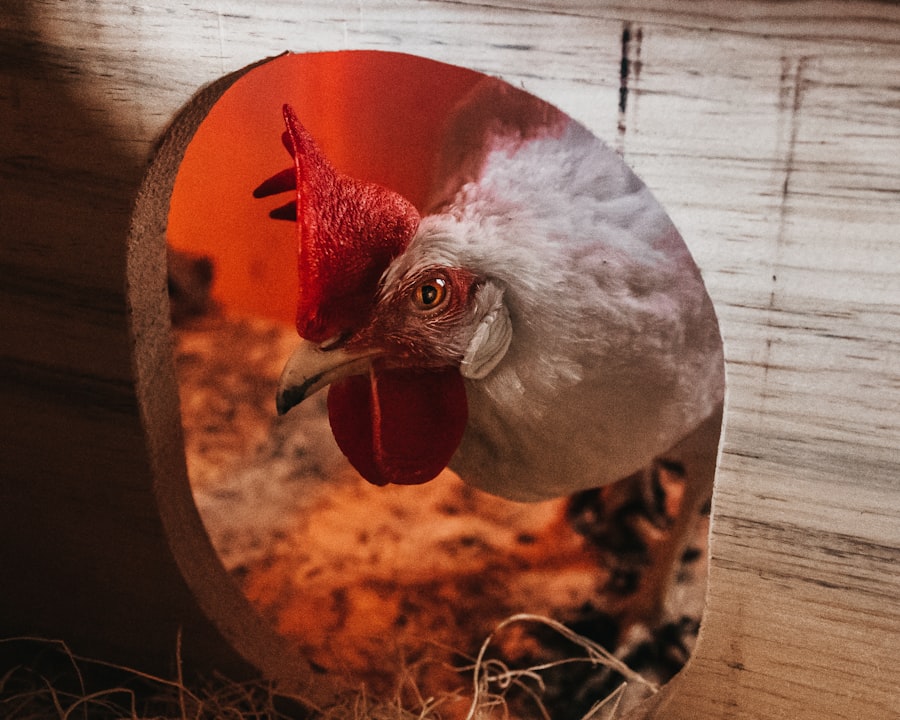
Securing the Coop and Run
It’s important to secure their coop and run with sturdy locks and barriers to prevent predators from gaining access.
Deterrent Methods
In addition to securing their living environment, it’s important to be vigilant and proactive in deterring potential threats. This can include using motion-activated lights or sound devices, installing predator-proof fencing, or even getting a livestock guardian animal such as a dog or llama.
Proactive Measures
By taking these steps, you can significantly reduce the risk of predator attacks and create a safe and secure environment for your backyard flock to thrive.
Ensuring Proper Egg Collection and Storage
Proper egg collection and storage are essential for maintaining the quality and safety of your backyard flock’s eggs. Eggs should be collected at least once a day to prevent them from being damaged or attracting pests. It’s important to handle eggs gently and avoid washing them unless absolutely necessary as this can remove their natural protective coating.
Eggs should be stored in a cool place away from strong odors or contaminants such as onions or cleaning products. They should be stored with the pointed end down in an egg carton or container to help maintain their freshness. In conclusion, caring for a backyard flock of chickens involves careful consideration of various factors such as breed selection, housing, feeding, health maintenance, egg production management, predator protection, egg collection, and storage practices.
By taking the time to address each of these aspects with diligence and care, you can ensure that your chickens lead happy, healthy lives while providing you with fresh eggs and companionship.
If you’re looking for tips on how to keep egg laying chickens, you might want to check out this article on the Producers Pride Sentinel Chicken Coop from Poultry Wizard. This coop is designed to provide a comfortable and secure environment for your chickens, which can help to maximize egg production. The article discusses the features of the coop and how it can benefit your flock. It’s definitely worth a read if you’re interested in optimizing your chicken’s egg laying potential. (source)
FAQs
What are the basic requirements for keeping egg laying chickens?
To keep egg laying chickens, you will need a suitable coop or housing, access to fresh water, a balanced diet, and proper care and maintenance.
What type of housing is suitable for egg laying chickens?
A suitable housing for egg laying chickens should provide protection from predators, adequate ventilation, nesting boxes, and roosting perches. The coop should also be easy to clean and maintain.
What should be included in the diet of egg laying chickens?
The diet of egg laying chickens should include a balanced commercial layer feed, supplemented with fresh fruits, vegetables, and occasional treats such as mealworms. Access to grit and oyster shell is also important for calcium intake.
How can I ensure the health and well-being of my egg laying chickens?
To ensure the health and well-being of your egg laying chickens, provide regular access to clean water, maintain a clean living environment, monitor for signs of illness, and provide regular veterinary care.
How can I encourage egg production in my chickens?
To encourage egg production in your chickens, provide a consistent light cycle, ensure a balanced diet, and provide a stress-free environment. Additionally, collecting eggs regularly and providing comfortable nesting boxes can also encourage egg laying.
Meet Walter, the feathered-friend fanatic of Florida! Nestled in the sunshine state, Walter struts through life with his feathered companions, clucking his way to happiness. With a coop that’s fancier than a five-star hotel, he’s the Don Juan of the chicken world. When he’s not teaching his hens to do the cha-cha, you’ll find him in a heated debate with his prized rooster, Sir Clucks-a-Lot. Walter’s poultry passion is no yolk; he’s the sunny-side-up guy you never knew you needed in your flock of friends!

